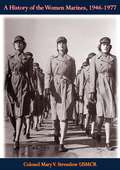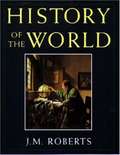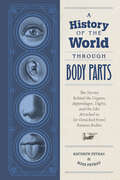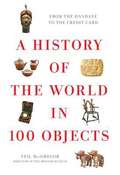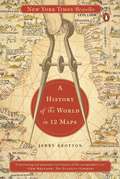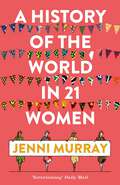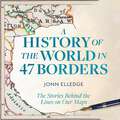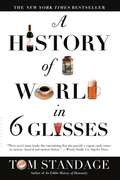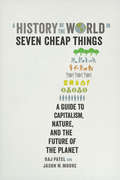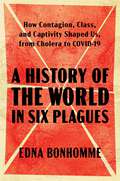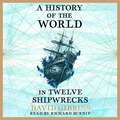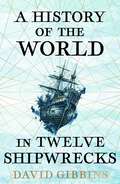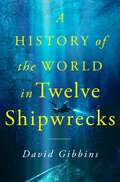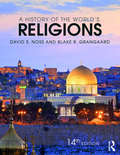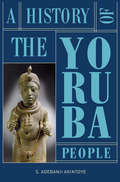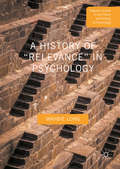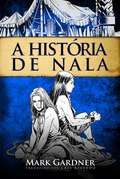- Table View
- List View
A History of the Women Marines, 1946-1977
by Colonel Mary V. Stremlow USMCRProvides a historical review of women in the Marine Corps from their reservist status in 1946 through active status in 1977. Based upon original research. Illustrated.
A History of the World
by J. M. RobertsFrom the evolution of Homo Sapiens to the exploration of space, the vast landscape of human history appears in this authoritative, readable book. Evocatively illustrated, this work offers an outstanding one-volume survey of the major events, developments, and personalities of the known past. Illus. Maps.
A History of the World Through Body Parts: The Stories Behind the Organs, Appendages, Digits, and the Like Attached to (or Detached from) Famous Bodies
by Ross Petras Kathy PetrasA grab bag of historic spleens, chins, and more, this is your ultimate literary dissection of body parts throughout history!From famous craniums to prominent breasts, ancient spleens and bound feet, this book will bring history to life in a whole new way. With their inimitable wit and probing intelligence, authors Kathy and Ross Petras look at the role the human body has played throughout history as each individual part becomes a jumping-off point for a wider look at the times. In far-ranging, quirky-yet-interrelated stories, learn about Charles II of Spain's jaw and the repercussions of inbreeding, what Anne Boleyn's heart says about the Crusades and the trend of dispersed burials, and what can be learned about the Aztecs through Moctezuma's pierced lip. A History of the World Through Body Parts is packed with fascinating little-known historical facts and anecdotes that will entertain, enlighten, and delight even the most well-read history buff.BESTSELLING AUTHORS: Kathy and Ross Petras have authored the New York Times bestseller You're Saying It Wrong and the hit calendar The 365 Stupidest Things Ever Said, now in its 24th year with over 4.8 million copies sold!ENGAGING CONTENT: Packed with rich material told with a lively and humorous voice, take a trip through history in this unique, exciting way.QUIRKY HISTORY FANS REJOICE!: For fans of The Disappearing Spoon, Wicked Plants, The Violinist's Thumb, The Sawbones Book and Strange Histories!Perfect for:• History buffs and pop history fans• Father's Day, birthday, and holiday shoppers
A History of the World in 100 Animals
by Simon BarnesFully illustrated in color, a fascinating exploration of the one hundred animals that have had the most profound influence on humanity throughout the ages.We are not alone. We are not alone on the planet. We are not alone in the countryside. We are not alone in cities. We are not alone in our homes. We are humans and we love the idea of our uniqueness. But the fact is that we humans are as much members of the animal kingdom as the cats and dogs we surround ourselves with, the cows and the fish we eat, and the bees who pollinate so many of our food-plants. In The History of the World in 100 Animals, award-winning author Simon Barnes selects the one hundred animals who have had the greatest impact on humanity and on whom humanity has had the greatest effect. He shows how we have domesticated animals for food and for transport, and how animals powered agriculture, making civilisation possible. A species of flea came close to destroying human civilisation in Europe, while the slaughter of a species of bovines was used to create one civilisation and destroy another. He explains how pigeons made possible the biggest single breakthrough in the history of human thought. In short, he charts the close relationship between humans and animals, finding examples from around the planet that bring the story of life on earth vividly to life, with great insight and understanding. The heresy of human uniqueness has led us across the millennia along the path of destruction. This book, beautifully illustrated throughout, helps us to understand our place in the world better, so that we might do a better job of looking after it. That might save the polar bears, the modern emblem of impending loss and destruction. It might even save ourselves.
A History of the World in 100 Objects
by Neil MacgregorThe blockbuster New York Times bestseller and the companion volume to the wildly popular radio seriesNeil MacGregor has blazed an unusual path to international renown. As director of the British Museum, he organized an exhibit that aimed to tell the history of humanity through the stories of one hundred objects made, used, venerated, or discarded by man. The exhibit and its accompanying BBC radio series broke broadcasting records and MacGregor's book became a bestselling sensation on both sides of the Atlantic and a huge Christmas hit, with more than 100,000 copies in print in the United States alone.Examining items from a chopping tool from Africa's Olduvai Gorge to the credit card, A History of the World in 100 Objects is an engrossing and profoundly original work of history that will captivate readers for many years to come.
A History of the World in 100 Weapons
by Chris McnabIt's a truism to say that history is written by the winners. But what is it about the winners that make them so powerful? In this enlightening new book, Chris McNab searches for answers to this question and much more, telling the story of the history of the world through the lens of the weapons used over time.Arranged by age, McNab details 100 weapons of history in a highly-illustrated format. Among these 100 weapons: * Roman gladius that helped establish the Roman Empire * Japanese Katana, or Samurai sword * English longbow, used to defeat the French at the battle of Agincourt * Maxim gun * Flying Fortress of World War II - the epitome of US military superiority * bomb on Hiroshima that made a weapon the ultimate deterrent * AK-47 rifle.A History of the World in 100 Weapons presents each weapon in full detail, exploring the how and why of the weapon's development, the times from which it emerged, how it was used in battle and by whom, and to what extent and impact. details of how and why each weapon was invented, the times they emerged from, how they were used in battle.Drawing on stories of famous battles, wars and leaders associated with each weapon, McNab presents a vivid history of the weapons themselves and their context in the development of world history.
A History of the World in 12 Maps
by Jerry BrottonA fascinating look at twelve maps-from Ancient Greece to Google Earth-and how they changed our world In this masterful study, historian and cartography expert Jerry Brotton explores a dozen of history’s most influential maps, from stone tablet to vibrant computer screen. Starting with Ptolemy, "father of modern geography,” and ending with satellite cartography, A History of the World in 12 Maps brings maps from classical Greece, Renaissance Europe, and the Islamic and Buddhist worlds to life and reveals their influence on how we-literally-look at our present world. As Brotton shows, the long road to our present geographical reality was rife with controversy, manipulation, and special interests trumping science. Through the centuries maps have been wielded to promote any number of imperial, religious, and economic agendas, and have represented the idiosyncratic and uneasy fusion of science and subjectivity. Brotton also conjures the worlds that produced these notable works of cartography and tells the stories of those who created, used, and misused them for their own ends. .
A History of the World in 21 Women: A Personal Selection
by Jenni MurrayFrom the bestselling author of A History of Britain in 21 Women The history of the world is the history of great women. Marie Curie discovered radium and revolutionised medical science. Empress Cixi transformed China. Frida Kahlo turned an unflinching eye on life and death. Anna Politkovskaya dared to speak truth to power, no matter the cost. Their names should be shouted from the rooftops. And that is exactly what Jenni Murray is here to do.
A History of the World in 47 Borders: The Stories Behind the Lines on Our Maps
by Jonn Elledge'Fascinating and hugely entertaining' MARINA HYDE'By turns surprising, funny, bleak, ridiculous, or all four of those at once' GIDEON DEFOEPeople have been drawing lines on maps for as long as there have been maps to draw on. Sometimes rooted in physical geography, sometimes entirely arbitrary, these lines might often have looked very different if a war or treaty or the decisions of a handful of tired Europeans had gone a different way. By telling the stories of these borders, we can learn a lot about how political identities are shaped, why the world looks the way it does - and about the scale of human folly.From the Roman attempts to define the boundaries of civilisation, to the secret British-French agreement to carve up the Ottoman Empire during the First World War, to the reason why landlocked Bolivia still maintains a navy, this is a fascinating, witty and surprising look at the history of the world told through its borders.
A History of the World in 47 Borders: The Stories Behind the Lines on Our Maps
by Jonn Elledge'Fascinating' TOM HOLLAND | 'A delight from start to finish' MIRANDA SAWYER'By turns surprising, funny, bleak, ridiculous, or all four of those at once' GIDEON DEFOEPeople have been drawing lines on maps for as long as there have been maps to draw on. Sometimes rooted in physical geography, sometimes entirely arbitrary, these lines might often have looked very different if a war or treaty or the decisions of a handful of tired Europeans had gone a different way. By telling the stories of these borders, we can learn a lot about how political identities are shaped, why the world looks the way it does - and about the scale of human folly.From the Roman attempts to define the boundaries of civilisation, to the secret British-French agreement to carve up the Ottoman Empire during the First World War, to the reason why landlocked Bolivia still maintains a navy, this is a fascinating, witty and surprising look at the history of the world told through its borders.More praise for 47 BORDERS: 'Fascinating and hugely entertaining' MARINA HYDE 'You'll never look at a map the same way again' STEPHEN BUSH '[A] clever, confounding history' PATRICK MAGUIRE'A witty grand tour' DORIAN LYNSKEY 'Warm, funny and sharply political' PHIL TINLINE
A History of the World in 6 Glasses
by Tom StandageFrom beer to Coca-Cola, the six drinks that have helped shape human history Throughout human history, certain drinks have done much more than just quench thirst. As Tom Standage relates with authority and charm, six of them have had a surprisingly pervasive influence on the course of history, becoming the defining drink during a pivotal historical period. A History of the World in 6 Glasses tells the story of humanity from the Stone Age to the 21st century through the lens of beer, wine, spirits, coffee, tea, and cola. Beer was first made in the Fertile Crescent and by 3000 B.C.E. was so important to Mesopotamia and Egypt that it was used to pay wages. In ancient Greece wine became the main export of her vast seaborne trade, helping spread Greek culture abroad. Spirits such as brandy and rum fueled the Age of Exploration, fortifying seamen on long voyages and oiling the pernicious slave trade. Although coffee originated in the Arab world, it stoked revolutionary thought in Europe during the Age of Reason, when coffeehouses became centers of intellectual exchange. And hundreds of years after the Chinese began drinking tea, it became especially popular in Britain, with far-reaching effects on British foreign policy. Finally, though carbonated drinks were invented in 18th-century Europe they became a 20th-century phenomenon, and Coca-Cola in particular is the leading symbol of globalization. For Tom Standage, each drink is a kind of technology, a catalyst for advancing culture by which he demonstrates the intricate interplay of different civilizations. You may never look at your favorite drink the same way again.
A History of the World in Seven Cheap Things: A Guide to Capitalism, Nature, and the Future of the Planet
by Raj Patel Jason W. MooreNature, money, work, care, food, energy, and lives: these are the seven things that have made our world and will shape its future. In making these things cheap, modern commerce has transformed, governed, and devastated Earth. In A History of the World in Seven Cheap Things, Raj Patel and Jason W. Moore present a new approach to analyzing today’s planetary emergencies. Bringing the latest ecological research together with histories of colonialism, indigenous struggles, slave revolts, and other rebellions and uprisings, Patel and Moore demonstrate that throughout history, crises have always prompted fresh strategies to make the world cheap and safe for capitalism. At a time of crisis in all seven cheap things, innovative and systemic thinking is urgently required. This book proposes a radical new way of understanding—and reclaiming—the planet in the turbulent twenty-first century.
A History of the World in Six Plagues: How Contagion, Class and Captivity Shape Us, from Cholera to Covid-19
by Edna BonhommeA History of the World in Six Plagues unveils a powerful and unsettling truth: epidemic diseases enter the world by chance, but they become catastrophic by human design.In this groundbreaking work, Bonhomme explores how six pivotal diseases-Cholera, HIV/AIDS, the Spanish Flu, Sleeping Sickness, Ebola, and COVID-19-have shaped the trajectory of human history. With vivid storytelling and rigorous research, she reveals how pandemics have consistently widened the gaps in racial, economic, and sociopolitical divides, from the slave ships of the Atlantic to today's fractured healthcare systems.How did a colonial obsession with sugar amplify the devastation of Cholera? Why did sleeping sickness become a weapon of empire in Tanzania? And how has COVID-19 magnified inequities in our modern, interconnected world?Bonhomme's incisive analysis transforms our understanding of public health, not as a neutral force but as a stage where power, policy, and prejudice collide. Urgent and illuminating, A History of the World in Six Plagues is not just a history of disease - it is a call to reimagine a more equitable future in the face of ongoing global health challenges.'This book tells the accounts of people who deserved better. It is also a story of redemption, and of the little child in all of us, curled up alone in a huge bed, without her parents, who wants to be healthy and free.'
A History of the World in Six Plagues: How Contagion, Class and Captivity Shape Us, from Cholera to Covid-19
by Edna BonhommeA History of the World in Six Plagues unveils a powerful and unsettling truth: epidemic diseases enter the world by chance, but they become catastrophic by human design.In this groundbreaking work, Bonhomme explores how six pivotal diseases-Cholera, HIV/AIDS, the Spanish Flu, Sleeping Sickness, Ebola, and COVID-19-have shaped the trajectory of human history. With vivid storytelling and rigorous research, she reveals how pandemics have consistently widened the gaps in racial, economic, and sociopolitical divides, from the slave ships of the Atlantic to today's fractured healthcare systems.How did a colonial obsession with sugar amplify the devastation of Cholera? Why did sleeping sickness become a weapon of empire in Tanzania? And how has COVID-19 magnified inequities in our modern, interconnected world?Bonhomme's incisive analysis transforms our understanding of public health, not as a neutral force but as a stage where power, policy, and prejudice collide. Urgent and illuminating, A History of the World in Six Plagues is not just a history of disease - it is a call to reimagine a more equitable future in the face of ongoing global health challenges.'This book tells the accounts of people who deserved better. It is also a story of redemption, and of the little child in all of us, curled up alone in a huge bed, without her parents, who wants to be healthy and free.'
A History of the World in Six Plagues: How Contagion, Class, and Captivity Shaped Us, from Cholera to COVID-19
by Edna BonhommeA deeply reported, insightful, and literary account of humankind&’s battles with epidemic disease, and their outsized role in deepening inequality along racial, ethnic, class, and gender lines—in the vein of Medical Apartheid and Killing the Black Body.Epidemic diseases enter the world by chance, but they become catastrophic by human design. With clear-eyed research and lush prose, A History of the World in Six Plagues shows that throughout history, outbreaks of disease have been exacerbated by and gone on to further expand the racial, economic, and sociopolitical divides we allow to fester in times of good health. Princeton-trained historian Edna Bonhomme&’s examination of humanity&’s disastrous treatment of pandemic disease takes us across place and time from Port-au-Prince to Tanzania, and from plantation-era America to our modern COVID-19-scarred world to unravel shocking truths about the patterns of discrimination in the face of disease. Based on in-depth research and cultural analysis, Bonhomme explores Cholera, HIV/AIDS, the Spanish Flu, Sleeping Sickness, Ebola, and COVID-19 amidst the backdrop of unequal public policy. But much more than a remarkable history, A History of the World in Six Plagues is also a rising call for change.
A History of the World in Twelve Shipwrecks
by David Gibbins'Masterful and entrancing - this is big history at its best.' Professor Alice Roberts, author of Ancestors'A real-life Indiana Jones takes readers on a dive through these underwater museums, revealing the sunken secrets of the past' The Times'Fascinating... wonderful material, well researched and placed in its wider context' SpectatorFrom a Bronze Age ship built during the age of Queen Nefertiti and filled with ancient treasures, a Viking warship made for King Cnut himself, Henry VIII's spectacular Mary Rose and the golden age of the Tudor court, to the exploration of the Arctic, the tragic story of HMS Terror and tales of bravery and endurance aboard HMS Gairsoppa in World War Two, these are the stories of some of the greatest underwater discoveries of all time. A rich and exciting narrative, this is not just the story of those ships and the people who sailed on them, the cargo and treasure they carried and their tragic fate. This is also the story of the spread of people, religion and ideas around the world, a story of colonialism and migration which continues today.Drawing on decades of experience excavating shipwrecks around the world, renowned maritime archaeologist David Gibbins reveals the riches beneath the waves and shows us how the treasures found there can be a porthole to the past to tell a new story about the world and its underwater secrets.
A History of the World in Twelve Shipwrecks
by David Gibbins'Masterful and entrancing - this is big history at its best.' Professor Alice Roberts, author of Ancestors'A real-life Indiana Jones takes readers on a dive through these underwater museums, revealing the sunken secrets of the past' The Times'Fascinating... wonderful material, well researched and placed in its wider context' SpectatorFrom a Bronze Age ship built during the age of Queen Nefertiti and filled with ancient treasures, a Viking warship made for King Cnut himself, Henry VIII's spectacular Mary Rose and the golden age of the Tudor court, to the exploration of the Arctic, the tragic story of HMS Terror and tales of bravery and endurance aboard HMS Gairsoppa in World War Two, these are the stories of some of the greatest underwater discoveries of all time. A rich and exciting narrative, this is not just the story of those ships and the people who sailed on them, the cargo and treasure they carried and their tragic fate. This is also the story of the spread of people, religion and ideas around the world, a story of colonialism and migration which continues today.Drawing on decades of experience excavating shipwrecks around the world, renowned maritime archaeologist David Gibbins reveals the riches beneath the waves and shows us how the treasures found there can be a porthole to the past to tell a new story about the world and its underwater secrets.
A History of the World in Twelve Shipwrecks
by David GibbinsFrom renowned underwater archaeologist David Gibbins comes an exciting and rich narrative of human history told through the archaeological discoveries of twelve shipwrecks across time.The Viking warship of King Cnut the Great. Henry VIII's the Mary Rose. Captain John Franklin's doomed HMS Terror. The SS Gairsoppa, destroyed by a Nazi U-boat in the Atlantic during World War II.Since we first set sail on the open sea, ships and their wrecks have been an inevitable part of human history. Archaeologists have made spectacular discoveries excavating these sunken ships, their protective underwater cocoon keeping evidence of past civilizations preserved. Now, for the first time, world renowned maritime archeologist David Gibbins ties together the stories of some of the most significant shipwrecks in time to form a single overarching narrative of world history.A History of the World in Twelve Shipwrecks is not just the story of those ships, the people who sailed on them, and the cargo and treasure they carried, but also the story of the spread of people, religion, and ideas around the world; it is a story of colonialism, migration, and the indominable human spirit that continues today. From the glittering Bronze Age, to the world of Caesar's Rome, through the era of the Vikings, to the exploration of the Arctic, Gibbins uses shipwrecks to tell all.Drawing on decades of experience excavating shipwrecks around the world, Gibbins reveals the riches beneath the waves and shows us how the treasures found there can be a porthole to the past that tell a new story about the world and its underwater secrets.
A History of the World in the 20th Century (Enlarged Edition)
by J. A. S. GrenvilleThe twentieth century witnessed radical changes in almost every area of human activity.This book covers the social and political changes that shaped the world.
A History of the World's Religions
by David S. Noss Blake R. GrangaardA History of the World's Religions bridges the interval between the founding of religions and their present state, and gives students an accurate look at the religions of the world by including descriptive and interpretive details from original source materials. Refined by over forty years of dialogue and correspondence with religious experts and practitioners around the world, A History of the World's Religions is widely regarded as the hallmark of scholarship, fairness, and accuracy in its field. It is also the most thorough yet manageable history of world religion available in a single volume. A History of the World’s Religions examines the following topics: Some Primal and Bygone Religions The Religions of South Asia The Religions of East Asia The Religions of the Middle East This fourteenth edition is fully updated throughout with new images and inset text boxes to help guide students and instructors. Complete with figures, timelines and maps, this is an ideal resource for anyone wanting an accessible and comprehensive introduction to the world’s religions.
A History of the Yale Law School: The Tercentennial Lectures
by Anthony T. KronmanA fascinating examination of the history of the Yale Law School and its impact on the development of legal education in the U. S. The entity that became the Yale Law School started life early in the nineteenth century as a proprietary school, operated as a sideline by a couple of New Haven lawyers. The New Haven school affiliated with Yale in the 1820s, but it remained so frail that in 1845 and again in 1869 the University seriously considered closing it down. From these humble origins, the Yale Law School went on to become the most influential of American law schools. In the later nineteenth century the School instigated the multidisciplinary approach to law that has subsequently won nearly universal acceptance. In the 1930s the Yale Law School became the center of the jurisprudential movement known as legal realism, which has ever since shaped American law. In the second half of the twentieth century Yale brought the study of constitutional and international law to prominence, overcoming the emphasis on private law that had dominated American law schools. By the end of the twentieth century, Yale was widely acknowledged as the nation's leading law school. The essays in this collection trace these notable developments. They originated as a lecture series convened to commemorate the tercentenary of Yale University. A distinguished group of scholars assembled to explore the history of the School from the earliest days down to modern times. This volume preserves the highly readable format of the original lectures, supported with full scholarly citations.
A History of the Yoruba People
by Stephen Adebanji AkintoyeA History of the Yoruba People is an audacious comprehensive exploration of the founding and growth of one of the most influential groups in Africa. In this commendable book, S. Adebanji Akintoye deploys four decades of historiography research with current interpretation and analyses to present the most complete and authoritative volume on the Yoruba to date. This exceptionally lucid account gathers and imparts a wealth of research and discourses on Yoruba studies for a wider group of readership than ever before. Very few attempts have tried to grapple fully with the historical foundations and development of a group that has contributed to shaping the way African communities are analysed from prehistoric to modern times."A wondrous achievement, a profound pioneering breakthrough, a reminder to New World historians of what 'proper history' is all about - a recount which draws the full landed and spiritual portrait of a people from its roots up - A History of the Yoruba People is yet another superlative work of brilliant chronicling and persuasive interpretation by an outstanding scholar and historiographer of Africa.~ Prof Michael Vickers, author of Ethnicity and Sub-Nationalism in Nigeria: Movement for a Mid-West Stateand Phantom Trail: Discovering Ancient America. "This book is more than a 21st century attempt to (re)present a comprehensive history of the Yoruba ... shifting the focus to a broader and more eclectic account. It is a far more nuanced, evidentially-sensitive, systematic account." ~ Wale Adebanwi, Assist. Prof., African American and African Studies, UC Davis, USA."Akintoye links the Yoruba past with the present, broadening and transcending Samuel Johnson in scope and time, and reviving both the passion and agenda that are over a century old, to reveal the long history and definable identity of a people and an ethnicity...Here is an accessible book, with the promise of being ageless, written by the only person who has sustained an academic interest in this subject for nearly half a century, providing the treasures of accumulated knowledge, robust encounters with received wisdom, and mature judgement about the future." ~ Toyin Falola, The Frances Higginbotham Nalle Professor in History, University of Texas at Austin, USA.
A History of “Relevance” in Psychology (Palgrave Studies in the Theory and History of Psychology)
by Wahbie LongThis book represents the first attempt to historicise and theorise appeals for ‘relevance’ in psychology. It argues that the persistence of questions about the ‘relevance’ of psychology derives from the discipline’s terminal inability to define its subject matter, its reliance on a socially disinterested science to underwrite its knowledge claims, and its consequent failure to address itself to the needs of a rapidly changing world. The chapters go on to consider the ‘relevance’ debate within South African psychology, by critically analysing discourse of forty-five presidential, keynote and opening addresses delivered at annual national psychology congresses between 1950 and 2011, and observes how appeals for ‘relevance’ were advanced by reactionary, progressive and radical psychologists alike. The book presents, moreover, the provocative thesis that the revolutionary quest for ‘social relevance’ that began in the 1960s has been supplanted by an ethic of ‘market relevance’ that threatens to isolate the discipline still further from the anxieties of broader society. With powerful interest groups continuing to co-opt psychologists without relent, this is a development that only psychologists of conscience can arrest.
A Histroy of Iraq
by Charles TrippTo understand Iraq, Charles Tripp's history is the book to read. Since its first appearance in 2000, it has become a classic in the field of Middle East studies, read and admired by students, soldiers, policymakers and journalists. The book is now updated to include the recent American invasion, the fall and capture of Saddam Hussein and the subsequent descent into civil strife. What is clear is that much that has happened since 2003 was foreshadowed in the account found in this book. Tripp's thesis is that the history of Iraq throughout the twentieth-century has made it what it is today, but also provides alternative futures. Unless this is properly understood, many of the themes explored in this book - patron-client relations, organized violence, sectarian, ethnic and tribal difference - will continue to exert a hold over the future of Iraq as they did over its past.
A História de Nala
by Mark Gardner Cris AzevedoNala, uma escrava da dinastia Han, e sua irmã Hazina são resgatadas de um mercador por um misterioso estranho. Quais são as verdadeiras intenções deste homem? Que decisões tomará Nala quando estiver frente a frente com a verdade?
